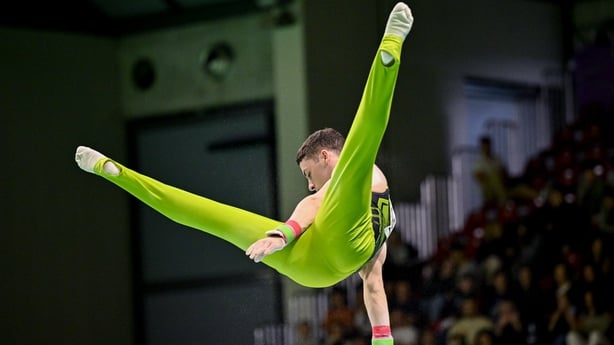There's a lot going on in the auditorium in the sport of gymnastics, well six things in fact in men's competition: floor, vault, rings, pommel horse, parallel bars, and horizontal bar. Women participate in four: floor, vault, uneven bars, and beam.
The Bercy Arena, a 14,000-seat venue, is playing host to gymnastics at Paris 2024. Built in 1984, this venue hosts not only high-level sports events such as the Rolex Paris Masters in tennis, but also concerts.
And so on Saturday morning, the men's competition got underway. Ireland's Rhys McCleneghan is a double world champion and a three-time European gold medallist on the pommel horse and will aim to reach the final of his discipline later today; he's due in action at 8.42pm. You can watch it live on RTÉ2 and the RTÉ Player.
The pommel is McClenaghan's only event, others participate in other apparatuses. Max Whitlock of Great Britain, a leading contender on the pommel, is tackling four disciplines.
From the vantage point of the commentary box, one's attention shifts from one apparatus to another, though there are times when only one or two gymnasts are competing.

Colm Murray, who is part of RTÉ's commentary team alongside Gerry Kelly, was a former international gymnast and is now a coach, working out of the Sport Ireland campus. He also has judged internationally, so one sought his expertise on how scores are allocated in gymnastics.
"There are two values, there is a difficulty score and an execution score," he began.
"We have to marry the two of them - and that's what gives us our final score".
Colm promised he would keep it simple. And in fairness, he did.
He continues: "The execution starts at 10. A perfect 10, still in theory, exists, that's if you execute your routine perfectly.
"So, we start at 10, and then we start working downward - as deductions are made: what's your form like, what's your landing like, what's your body line like? We also look at shape, we look for any deviations from the so-called perfect position. Landings, one's step, are also deductible for the execution of the exercise.

"As for difficulty, they look at your best 10 elements; you might do 20, but it's only the best 10. Each element is given a value: A, B, C, D.
"However, the more complicated the element, the more risk is involved. If you don't get it right, you could lose more than it's actually worth. If you do something very complicated and you fall down, you would lost a full mark out of this, so now you're out of nine.
"So, you have to balance the difficulty, which is added to your execution. Difficulty is also based on complicated rules, whereby you can't do the same type of element."
Expanding more on 'elements', Murray added: "An example of an element would be a front somersault or a double somersault, or with a twist.
"These are individual elements but you only use so many elements, you then have to change. If not, the general person in the crowd would get bored. Elements are within groups and you must do something from each group. It forces the gymnast not to favour one aspect of an exercise."
So, in terms of finding the right balance, Murray simply says: "It's a a marriage of how difficult and spectacular you want to make the routine versus how you execute it."

In assessing Rhys McClenaghan, the gymnast, "he tends not to go after the high difficulty mark", was Murray's view. "Rhys would get a six on the difficulty and then a 10 on the execution gives you a very good score. He has got over 15, this evening is about getting to a final and he will achieve that.
"He will do a straightforward routine with minimum execution, not pushing the boundaries of risk."
While Gaelic football is currently gathering the great and the good to look at changes to the rules, gymnastics is always looking to improve the sport as a spectacle.
As Murray outlined: "A code of points re-evaluate which way gymnastics is going. We'll make a few rule changes to make it more attractive. Judges would have to do an exam every four years, with a 90% pass rate. If you pass that exam you have a licence for four years to judge internationally.
"There are also category of judges depending on how well you do in the exam - and that allows you judge certain events."
Upon leaving the Bercy Arena, I was greeted by security personnel holding hands in a line, preventing us from making any progress towards the metro. And then out of nowhere, a fleet of black cars pulled up in front of one of the entrances .
Out jumped six men, dressed in suits, some looking meaner than others. And then two of these said gentlemen stood either side at the front of one of the vehicles.

A door was opened, and out came Jill Biden. A shout of "USA" came from behind me; the First Lady smiled and made her way into the venue. The human chain in front of us gave way and we were allowed to proceed in the driving Paris rain.
Watch the 2024 Olympic Games with 14 hours of televised action on RTÉ2 and RTÉ Player each day. Listen to extensive radio coverage on RTÉ Radio 1 and 2fm's Game On and follow each moment from Paris on RTÉ.ie, the RTÉ News app and all RTÉ digital platforms. Listen to the daily RTÉ Sport Olympics Podcast.



